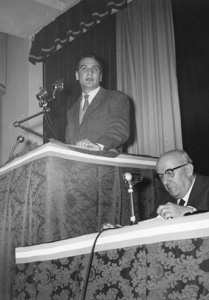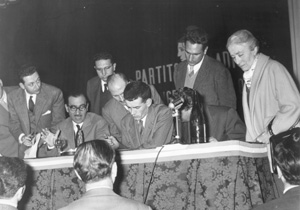27/28 FEBRUARY-1 MARCH - Italy: Rome - FIRST CONGRESS
27/28 FEBRUARY-1 MARCH - Italy: Rome - FIRST CONGRESS
The limits of a Party, which three years after its foundation had still not been able to equip itself with modern structures nor promote political initiatives outside Radical circles connected with L’Espresso and conferences organized by Amici del Mondo (Friends of the World), were already evident at the first Congress.
Marco PANNELLA, in asking each congressperson to express themselves sincerely - after three years without any form of internal debate - declared that the majority of the platforms which had resulted in the RP being hailed as a "new party for new politics" had not been realized: in particular, adequate structures had not been created to accommodate and organize - or permit the organization of - new emergent forces that had put their trust in the Party. The Statute was outmoded and inadequate; the Comitato Studi (Research Committee), conceived to provide new stimuli for the Party, had not been instituted; the subject of Federalism had been shelved, while European nationalism constituted a growing threat; no further mention had been made of denouncing the (Italian) Concordat. But above all there was no ruling group capable of assuming the responsibility of running the Party and its daily affairs, and encouraging local groups to look within to establish the platforms and find the resources - also financial - for their activities, rather than continually soliciting these things from the central organs. (AP 3482)
Furthermore, the Radical Party was recovering from two electoral defeats, particularly that of 25 May 1958 in which the Radical-Republican Alliance obtained only 1.4% of the votes - as opposed to 1.6% won by the Italian Republican Party (PRI) alone in the 1953 elections. Moreover, none of the six deputies elected was a Radical. In the same period the fall of Amintore FANFANI’s government prepared the way for the alliance with the Right that would later result in TAMBRONI's government coming to power.
In this political context, the report of the National Executive Council (approved by the first National Congress) reaffirmed, on the one hand, its opposition to Christian Democrat coalition governments and, on the other, confirmed the proposed alliance with the democratic Left that presented an alternative to the Christian Democrat Party (DC) and to the Italian Communist Party (PCI).

Elected organs:
Secretariat: Leopoldo PICCARDI, Arrigo OLIVETTI, Franco LIBONATI
Vice-Secretary: Eugenio SCALFARI
Il Paese publishes speech by Marco PANNELLA, entitled "The Crushing Logic of the III International." Addressing the Communist ruling group, Pannella raised a question central to Italian political history: "If to build a modern democratic State in Italy, at least to the degree that it is provided for by the Constitution, a new majority in Parliament, in the country, is necessary, why not verify, among other things, the possibility of a joint action by the democratic Left and by part of the Catholics and the Communists? Although Pannella has criticized Communist actions in the past, he did not ask them to forsake their principals. But he did ask them to show: "a more specific and spontaneous interest in a democratic alternative to government, and thereby to stop proposing miraculous policies that they could not even implement alone," and to adopt a more European vision, recognizing new international points of reference "There exists a potential democratic force, consisting of the English Labour Party, the French trade unions, including the Catholic and Socialist ones, and German social democracy. The Italian Communist Party should address these interlocutors, not the isolated groups of Belgian, Dutch, Scandinavian and English Communists that do not represent any real popular or democratic position in their respective countries. These are the two possibilities for immediate consideration, that could start the ball rolling...
The speech created a split within the Radical Party: it was the first divergence from the "Radical left," the first departure from the strategy implemented by the ruling group of Il Mondo. The article also stimulated a leftist debate (with contributions from Social Democrat SARAGAT and Republican Ugo LAMALFA) which was brought to an abrupt end by Palmiro TOGLIATTI’s reply to PANNELLA. The former, while justifying the actions of the Communists in power in countries with a "popular democracy" and the elimination (not only political) of the allies for having abandoned the initial programme, denied the need for debate on the subject and limited himself to inviting "the various political movements in the country to compare views concerning a positive programme for democratic progress and for economic renewal, and then to develop the general outline of a new political orientation. When this has been achieved, the convergence of various political forces to reach this objective, and above all forces that carry as much weight as we do, will be a necessary thing." (AP 326) (AP 327)

1 March 1959 - Motion approved by the I National Congress of the Radical Party
"The I National Congress of the Radical Party, held in Rome on 27-28 February and 1 March 1959, has heard and approved the report of the National Executive Council, presented by Arrigo Olivetti, on activities carried out since 10 December 1955, when the Party was founded.
During this three-year period, the Party has had to embark on two electoral campaigns - local-government and national -, both fought under extremely difficult conditions. On these two occasions, as in the many other situations that have occurred during the last three years, the Party, with a great spirit of self-sacrifice and the sheer force of its ideals, has held its own against other far more experienced and powerful political forces. It can even be said that the Radicals have had to sustain the most violent opposition, which came from the clerical and Communist groups simultaneously, in an attempt to prevent the establishment of a democratic Left in our country.
Every member of the Party, at the core or on the fringes, in the executive organs or the ranks, faced with hardships and material and moral difficulties of every kind, has carried out their duty to the full, and the Congress fully recognizes this.
The Congress, having examined the political situation following the elections held on 25 May 1958, interprets FANFANI’s experiment as an attempt to introduce paternalistic reform, which cannot solve the present problems arising from unemployment, the inequality between North and South, feudal privileges, ecclesiastical interference and lack of technical know-how, that result in our country lagging behind modern Western civilization and prevent any form of civil and economic development.
That experiment, although totally inadequate for dealing with problems of such dimension, considerably annoyed the Christian Democrat Party and the clerical and conservative forces that support it, which, throwing all caution to the winds, have thought it opportune to establish an alliance with the extreme - and unconstitutional - right that has been protected for so long by Azione Cattolica (Catholic Action) and the economic right.
Since its very foundation, the Radical Party has affirmed that the political instrument which can offer an alternative to our country lies in a broad alliance of the democratic left, which would bring together all the secular and socialist democratic forces, while respecting their ideological differences and autonomous structures. The Radical Party is pleased to see that its time has not been spent in vain and its political action and appeals have obtained concrete results in this direction. The most encouraging evidence of this is the departure of the Republicans from the former Centrist majority, the autonomy recently achieved by the Socialist Party, the refusal of the most vital element of Social Democracy to be seduced by ambivalent ministerial support.
Faced with gowing dangers and seasoned opponents, Italy neverthless has a compounded force of the Democratic left capable of successfully waging campaigns for the autonomy of the State; for economic development; for raising the intellectual and moral standards of Italian citizens.
In view of the fact that we have made a valid contribution to the creation of the Italian democratic left, the Radical Party Congress engages its executive and peripheral organs, its activists and supporters, to continue their efforts to ensure that the new political line-up is extended and consolidated, until it is capable of offering the electorate a coherent and effective alternative.
Within this line-up, the Radical Party must pursue its specific tasks and maintain, indeed, fully develop, its characteristic political profile and programme, as defined in the BONESCHI report approved by this Congress.
In particular, the Party proposes:
civil authorities that are completely independent of ecclesiastical authorities;
unrelenting and systematic denouncement of public corruption and of abuse of party patronage in the State administration;
nationalization of electrical engineering and nuclear energy;
defence and improvement of state schools to allow them to rise above the appalling conditions in which they now find themselves;
Radio and Television watchdog committees;
foreign policy that pledges allegiance to Western alliances with respect to peace and the refusal of extremism, and to adhesion to common European institutions to the extent that they do not become instruments of oppression wielded by the privileged classes against workers and consumers.
With this programme and these objectives the Congress invites all members to rally round the Party and to contribute to preparing a better future for the country, in the name of justice and freedom." (AP 1222)
Elected organs:
Secretariat: Leopoldo PICCARDI, Arrigo OLIVETTI, Franco LIBONATI
Vice-Secretary: Eugenio SCALFARI